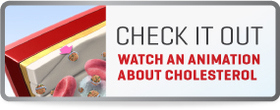Cholesterol is a waxy, fat-like substance that's found in all your cells and is necessary to help your body function properly. Your liver makes all the cholesterol you need. The remainder of the cholesterol in your body comes from foods.

When you have too much cholesterol in your blood, it can form plaque that can lead to narrowed arteries and possibly a heart attack or stroke. A healthy diet, regular exercise, and medication (if needed) can help reduce high cholesterol.
What Do Your Cholesterol Levels Mean?
Cholesterol isn’t just something that sits in your body like fat around your waist. It’s carried through your bloodstream by carriers made of fat (lipid) and proteins. These are called lipoproteins.
There are two types of cholesterol: LDL (low-density lipoprotein), or “bad” cholesterol, and HDL (high-density lipoprotein), or “good” cholesterol.
Too much of the bad kind, or not enough of the good kind, increases the risk that cholesterol will slowly build up in the inner walls of the arteries. High cholesterol can increase your risk of heart attack or stroke, even without symptoms that you can feel. Talk to your doctor about getting tested.
- Recommended Total: Less than 200
- Recommended LDL: Less than 100
- Recommended HDL: Greater than 50 in women, Greater than 40 in men
- Triglycerides: Less than 150
High cholesterol can be lowered! Go to the Check. Change. Control Cholesterol on the American Heart Association’s website to learn your risk for heart attack or stroke.
- Check your cholesterol levels. It’s key to know your numbers.
- Change your diet and lifestyle to help improve your levels.
- Control your cholesterol, with help from your doctor if needed.
You Might Also Like
Blood Pressure
Learn about high blood pressure (hypertension) and how to maintain a healthy blood pressure. Get reliable CDC resources for prevention and management.
Stroke
Learn about stroke, its symptoms, prevention, and recovery. Recognize warning signs and act fast. Access resources from CDC and American Heart Association.
Heart Attack
Recognize heart attack signs and symptoms, and act fast. Learn about prevention and risk factors. Access resources from CDC and American Heart Association.
Diabetes
There are a lot of simple ways you can help prevent diabetes, and it’s even possible to undo pre-diabetes. You have every reason to do everything you can, so use these resources to learn more and make a plan.
